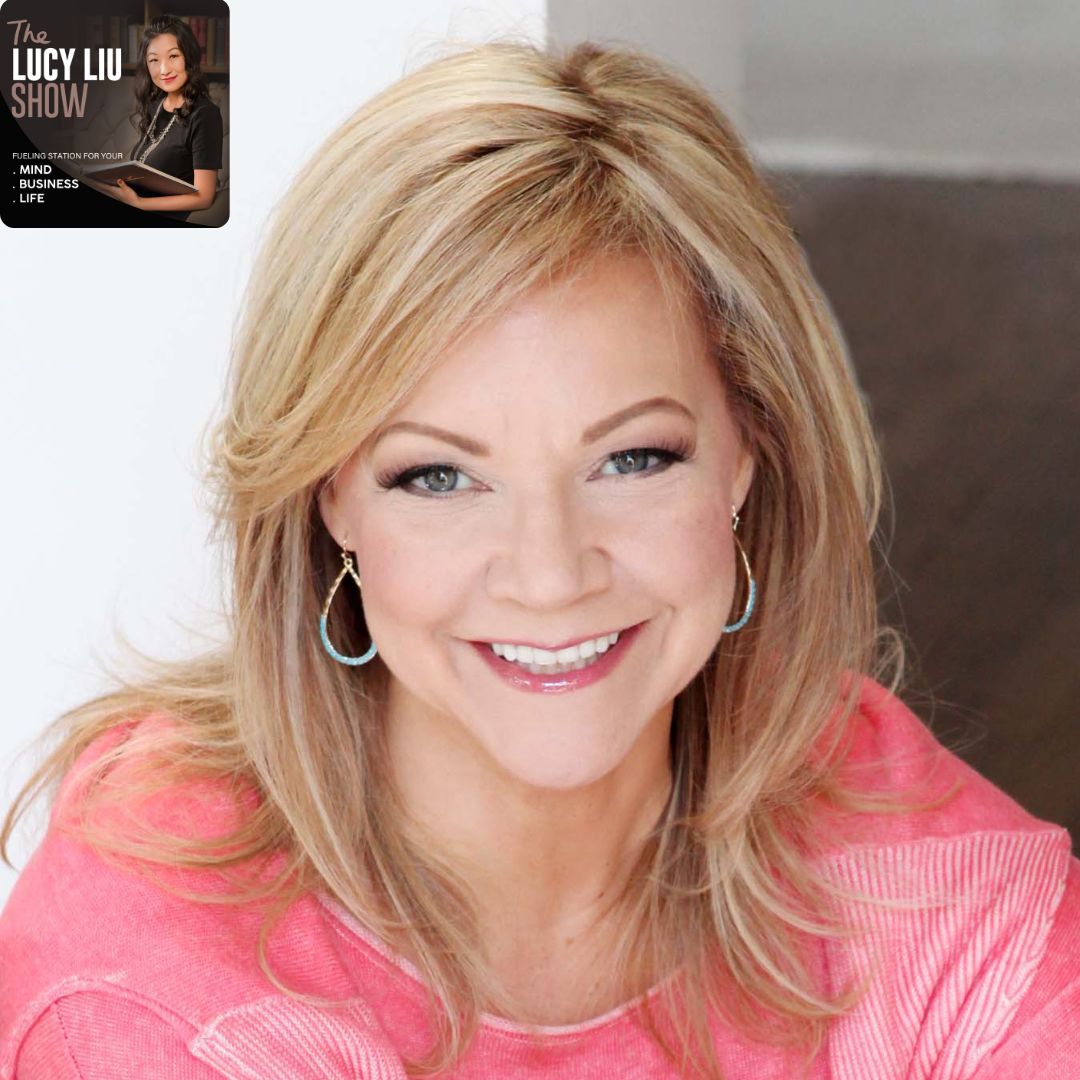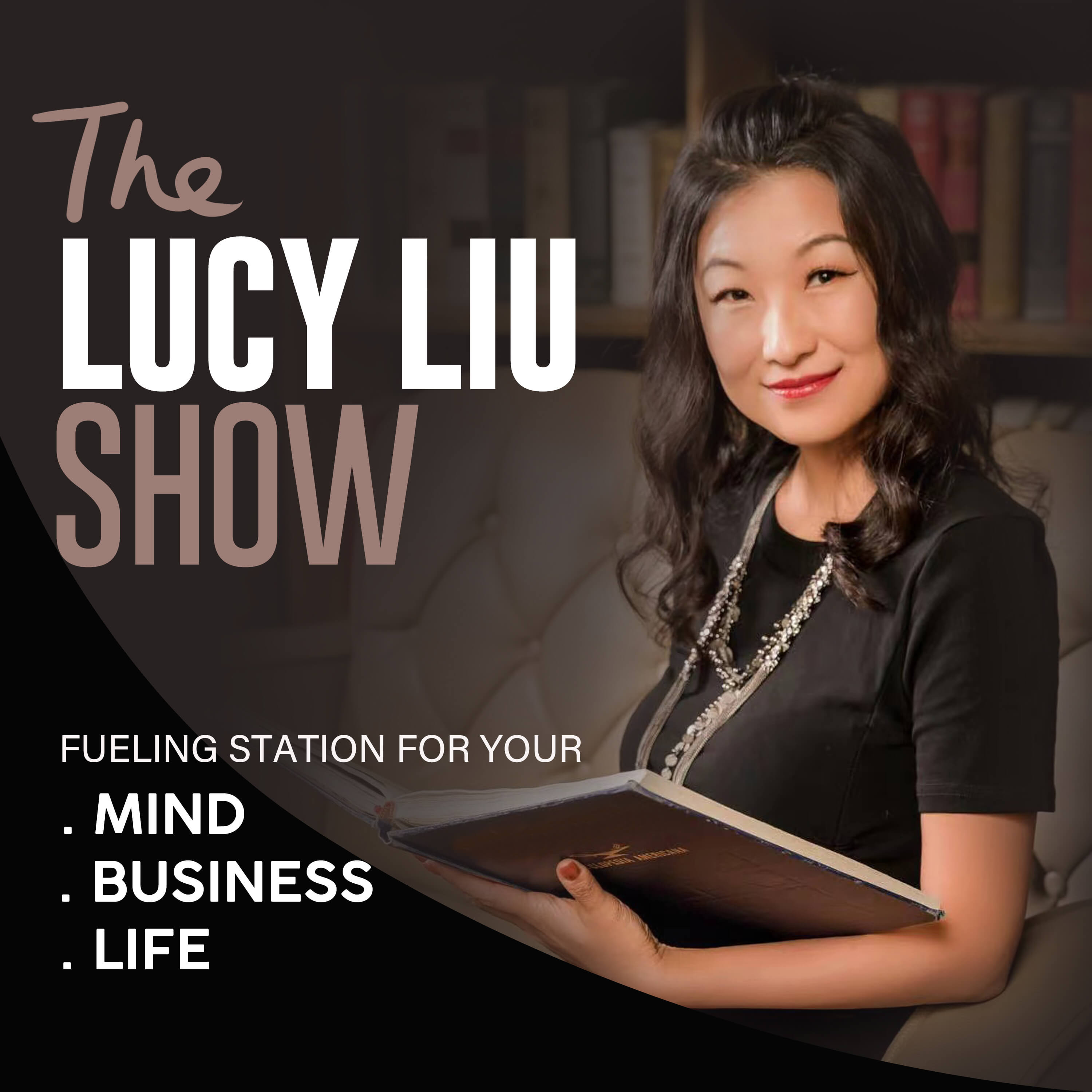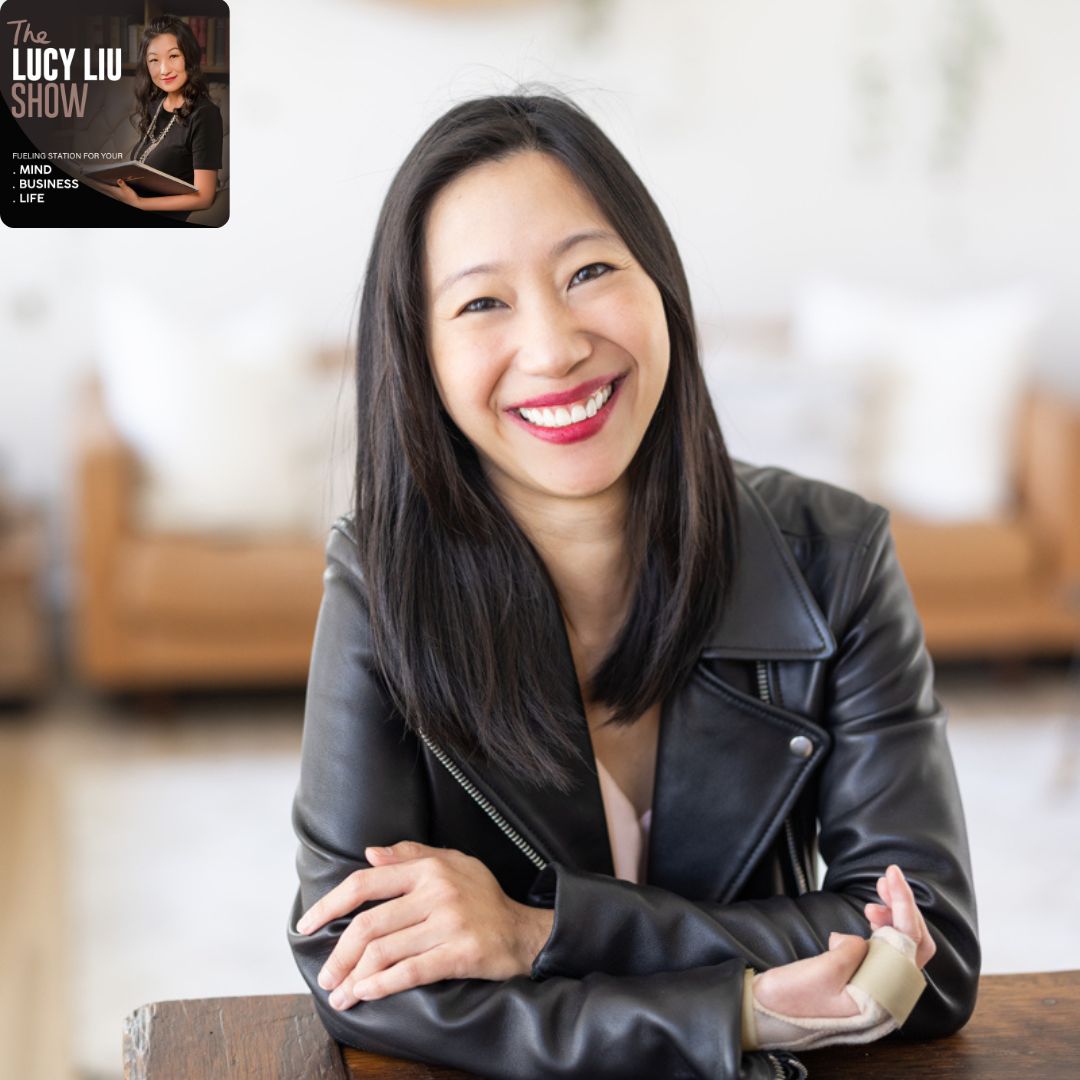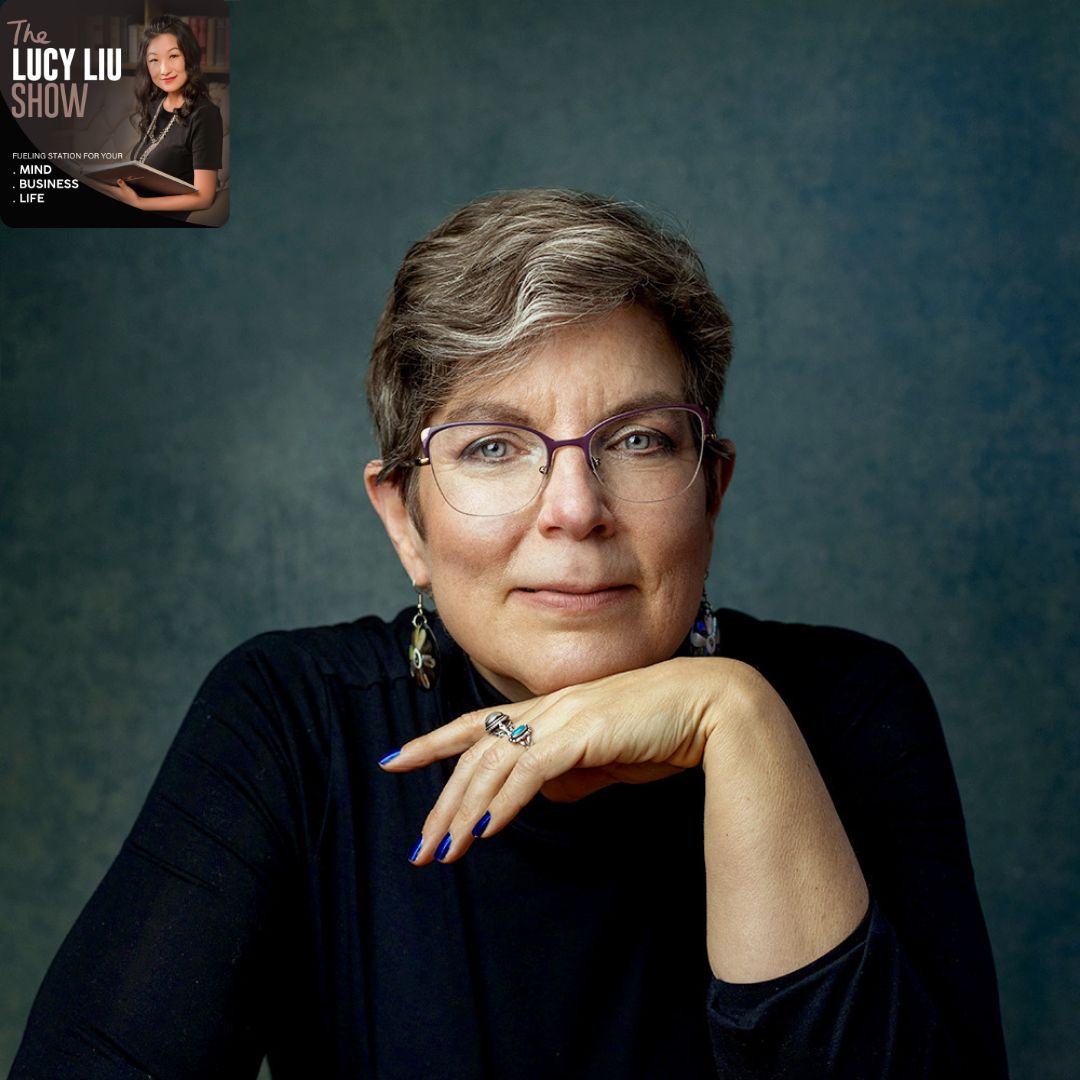245. How to Live Fearlessly in Business and Life with Rhonda Britten
Wanna learn how to live fearlessly in business and life?
No matter what industry or line of work you do, we are all the same, we are all human, and every human being on the planet gets stopped by fear.
So if you’ve ever faced fear and look to uplevel your life, this episode is for you.
LISTEN TO THE PODCAST
WATCH THE EPISODE
Guest Rhonda Britten is an Emmy Award-winner, Repeat Oprah guest, and Master Coach.
She has changed lives in over 600 episodes of reality TV, authored four bestsellers, including her “Fearless Living” which has been translated into 16 languages.
She is also a standing Ovation Keynote Speaker, Fear expert, podcast host and has been read, heard, and watched by millions.

Connect With Barb Nangle
https://www.linkedin.com/in/barbnangle
https://www.instagram.com/higherpowercoaching
Connect with Lucy:
Instagram: https://www.instagram.com/mslucyliu
Facebook: https://www.facebook.com/mslucyliu
Twitter: https://www.twitter.com/mslucyliu
LinkedIn: https://www.linkedin.com/in/mslucyliu
TikTok: https://www.tiktok.com/@mslucyliu
YouTube: https://youtube.com/@mslucyliu
Website: https://www.lucyliucoaching.com
Podcast: https://www.lucyliucoaching.com/podcast
Wanna double your confidence in 30 seconds?
Get the ultimate secret here:
FULL EPISODE TRANSCRIPT
Hello, hello, beautiful souls, no matter what industry or line of work you do, we are all the same. We are all human and every human being on this planet gets stopped by fear. So if you ever faced fear and look to uplevel your life, this episode is for you.
And I’m super excited to introduce to you my incredible guest today, Rhonda Britton. Rhonda is an Emmy Award winning repeat Oprah guest and master coach. She has changed the lives in over 600 episodes of reality TV authored for bestsellers, including her fearless living, which has been translated into 16 languages.
Isn’t that amazing? She is also a standing ovation keynote speaker, fear expert podcast host and has been read, heard and watched by millions. And we would be here all day if we listed out all of her accomplishments.
So let’s dig in. Welcome to the show, Rhonda.
I’m so excited to be here, Lucy, you’re just so delightful.
I can’t wait to get into this conversation.
Rhonda, you founded the fearless living Institute. So let’s start there.
What does fearless living mean to you?
Well, it definitely doesn’t mean you don’t have fear, right? Because fearless living really is about the willingness to master fear, we’re never going to get rid of fear. It’s part of our neurobiology.
And I think that’s where the misnomer is, right? The way people say, be fearless. And they go, well, I can’t be fearless because I have fear.
I go, yes, of course you do. Right? So it’s part of our neurobiology.
You’re not going to get rid of fear, but what you can do is understand how it works so that it doesn’t decide your life for you. You decide your life. And that takes a little extra attention, a little extra effort.
And that’s why I created something called the wheel of fear and the wheel of freedom to help you understand how fear works. I think the number one thing people tell me after they get their wheel of fear, their personalized unique wheel of fear and wheel of freedom is now I know why my life is the way it is. It explains everything, why you got married, why you got divorced, why you went to college, why you quit that job, everything.
It’s a mental model that you can use and apply to any part of your life.
Fear could be actually our friend. Would you agree?
Oh gosh, fear. I’m going to tell you something that I’ll never forget. I was on Steve Harvey’s show and I said this to him and he literally practically fell out of his chair.
And it is fear loves you. So fear loves you. Every emotion that you have, every feeling slash emotion, and we’re going to use those interchangeably right now, is a part and parcel of what you need in order to move your life forward.
So they’re just energy. Feelings are just energy. And they’re all here for a reason.
They’re all here for a reason. And fear is here for one reason and one reason only to keep you safe. The challenge is, is because we don’t understand how it works.
And we’ve all probably by now understand neuroscience and the brain and we’ve done a little bit of research in that. But that doesn’t necessarily tell you how it applies to your life. We don’t see it in 3D, so to speak, in our lives.
When you understand how fear works, everything changes.
Is that what happened to you? Did you see fear as a friend and that’s how you change your own life?
[Speaker 1]
Oh, no. First of all, and I think many people are like me, I never even thought I was afraid. So the joke of the century, the irony is that I actually work with fear because I grew up in upper Michigan, little tiny town.
I’m from Finnish heritage, which means we don’t feel. And so I never, even during my worst days, which I’ve had horrible, decades, really tragic and horrific decades and self-destructive decades. During all of that, I would have never said I’m afraid.
Never. I just thought I was crazy or I was stupid or I was procrastinating. And that’s the trick of fear.
Most people like me don’t know they’re afraid. Like I said, I didn’t know I was afraid, but what I’ve done in my book Fearless Living is I give you, and I’ll just do this real quick, just give you a couple little instances. Is that fear shows up in different ways for different people.
It sometimes shows up as anxiety, sometimes procrastination, sometimes pretend manipulation, defending yourself, blaming, deflecting, controlling, getting bitter, resentful, selfish, powerless, isolating yourself, settling, whining, hiding. All of these things are not because you’re wrong or you’re stupid or you’re crazy. It’s because there’s a fear underneath there.
The fear produces those fear responses. So you don’t procrastinate, you don’t deny, you don’t hide, you don’t become powerless, you don’t become a perfectionist unless there’s fear underneath. So most people go to try to solve the problem of, well, I’m perfectionist, I need to solve my perfectionism.
And I say, go for it, knock yourself out, go to perfectionism school, knock yourself out. Yet unless you really kind of dig in and understand how fear works holistically, something else will pop up. I’m sure we’ve all experienced, we thought we solved something and then all of a sudden it pops up again.
You’re like, well, I thought I saw this. Well, that’s because fears come play with you a different way.
Thank you for sharing. And to me, one of the top fears of life that I’ve seen is the very basic fear that I’m not good enough. Kind of related to what you talked about earlier, you’re procrastinating, you’re not doing it.
There’s the underlying fear that you’re telling yourself that you’re not good enough. And it changed my life when I instilled the mantra that enough is a decision. So is there anyone alive that somewhere deep down inside doesn’t have that basic fear of I’m not good enough?
Well, what I like to say about fear of not being good enough is that’s the generic version of a wheel of fear. So the wheel of fear has four parts. And if somebody doesn’t know their wheel of fear, that’s normally when they go, I fear of rejection, fear of failure, fear of success, fear of all those fears.
But then I go, well, what’s underneath that? They go, and they’ll stop and they’ll be like, you like fear, fear of not being good enough. And fear, like I said, fear of not being good enough is generic.
And there is nobody alive that doesn’t actually have a wheel of fear, doesn’t have fear. Because again, it’s part of our neurobiology. It’s part of how we’re wired, right?
We don’t just become afraid because we were raised a certain way. Don’t get me wrong. How you were raised does impact what kind of fear you have.
But so does your DNA. It’s been proven now that fears are handed down through our DNA. So when people say, I got to figure out why I’m like this, why am I like this?
Why am I like this? They’re trying to find that one moment, that one secret thing that happened to them that they can say, that’s why I’m like this. Well, you might behave a certain way because of the DNA that’s been handed down to generations.
So you may never find that one thing. So I invite you, I invite folks to not search for the one thing that’s caused them to be like this, but instead find the one thing that will set them free.
I love that. This is kind of like how we say sometimes we’re looking to learn, but sometimes it’s really about unlearning, right? And going a level deeper.
It’s about unwinding, right? It’s about unwinding, unlearning. It’s about actually having the humility to do so, because I think it takes great humility to be willing to say, what if I’m wrong about this?
What if I really don’t know this? What if I’m only using fear as a way to keep myself from avoiding taking action? What if I’m using fear?
What if I’m using procrastination to beat myself up so I don’t have the energy or the fortitude or the willingness or the grace or the heart to keep going for my dream? So we use fear. Fear creates that procrastination, beating yourself up, et cetera.
But then we use the same thing that fear gifts us with is a thing we use to let fear win. So I always say there’s never, ever, ever, ever, ever, ever, ever a reason to beat yourself up or another human being. You just don’t get to do that.
No. It’s the number one tool fear uses. I would say it’s the gas and the oil in the wheel of fear, because when we beat ourselves up, we’re actually participating in the demise and breaking apart of our connection to living the life our soul intended.
And that’s how we’re contributing. That’s how we’re participating. So we can change that any moment.
Just like you said, enough is beating yourself up. Just even realizing it’s a choice, I knew blew my mind. For most of my life, I didn’t think it was a choice.
I just thought that’s the way it was and that’s who I was. And I thought I was on my bad decisions. I thought I couldn’t get beyond my bad decisions.
I really thought that my past, I had to carry with me for the rest of my life. And when I started understanding how our neurobiology works and how fear works, I was able to put down those things. I was able to put down my past and actually create a new future for myself.
Powerful, powerful words, Rhonda. But do you think there are fears that are healthy for us by chance?
Well, there’s two things. One is we’re talking about a difference between emotional fears and instinct fears, physical fears. So instinct, our desire to survive physically, I don’t particularly like heights.
I’m not going like, I was in Norway recently and they have this rock that sticks out 20, 30 feet and go walk out on the rock and take an amazing picture. I’m like, no, thank you. I know that would be really cool and I’d be really happy if I did it, but no.
So we have physical fears and those are instincts. Those are physical survival. Yeah, those are awesome as long as they don’t prohibit you from living and taking action in the way you’d like, because there are ways to obviously minimize those.
And most of us though, like my fear of heights, I don’t have to be around heights. I don’t get activated all the time with my fear of heights. I don’t live on the 85th floor.
Yet what my work is, is the emotional fears that impact us every single day. The fear of being rejected, the fear of failure, the fear of loss, the fear of being judged. So these fears are a constant in our life.
So yes, we want our instincts. We want our ability to survive. The challenge is, is that our body and brain don’t know the difference between physical fears and emotional fears.
So the response is the same. So when I’m on the top of a 85th building or in Norway, you know, like go on the 20 feet, right? And I’m like, right, that’s a physical fear for my literal life.
And yet I can put myself in fear of rejection, fear of failure, fear of loss, fear of looking stupid, fear of looking foolish, fear of worthlessness, et cetera. And that same happens. So the way our neurobiology works is it doesn’t know the difference.
We’ve got to train ourselves to know the difference. We’ve got to discern, we’ve got to slice it out so that we can actually see the difference in our response to emotional, what’s going on emotionally with us versus what’s going on physically with us.
Thank you so much. I really love that differentiation. So know the difference when there’s a physical fear, right?
I’m same, I’m the same way. Every time I’m, I’m on a hike, I see snake, I scream and I run. I’m trying to save my own life, right?
Exactly. But if, if that hindered me from ever going on a hike, then that would be more of an emotional fear, right?
Well, it would, it might be a physical fear, but you’ve created such a barrier. Right. So it’s like, okay, I’m afraid of snakes.
Yeah. I don’t want to be around snakes either, but you want to hike. Then you’ve got to do the emotional work to heal and solve and move through the physical fear.
And that’s going to take, that’s going to take your body sensations. That’s going to take your thoughts, you know, your mindset, that’s going to take your heart and that’s going to take your spiritual foundation of what you believe ultimately in order to move you past that. But can it be done?
Absolutely.
Oh, absolutely. I love, I mean, I’ve seen so many snakes on my hike, but I’m still going.
Yay, Lucy.
Awesome. Okay. So for those who have done the work, they’ve done the personal development work, they’re working through their fear.
I’m like, they’re working through their shame, procrastination, all those things that you talked about earlier. Right. And they feel like they’re finally living that fearless life.
But then, but then their boss, their partner, someone else, their friend is living with fear and constantly nagging and telling them, you know, what’s scary. Well, obviously they’re with good intention. They want to protect you, but it happens.
And that is something we don’t want. So how do you go about dealing with that situation?
Well, that’s, that’s the whole reason, you know, I teach fearless conversations or I have a chapter in fearless living called fear junkies and fear busters, right? Because most fear junkies, like you said, they’re doing it with the best of intentions. It’s not like they’re trying to hurt or harm you.
There are some fear junkies that are by the way, but most don’t. So you get to learn something called boundaries. You get to learn something called communication skills.
So most of us, instead of learning the skills that are necessary in order to stand for ourselves and create a sovereignty within ourselves, we get mad at the people who aren’t doing what we think they should do. Right? So why are you afraid of that?
Stop being afraid. It’s like, well, but they’re afraid. So yelling at them is not really helpful.
So as we grow as individuals, as we build our compassion, as we build our empathy, as we build our ability to be honest and build our own personal responsibility and create a sense of sovereignty, we then learn the difference between where I put my hand on my shoulder for a reason. I know I had a therapist once that really brought this home, and this is how she did it with me. She goes, Rhonda, you end here.
And when she put her hand on her shoulder and rubbed it, I was like, what? She goes, you end here. This is where you end.
And that other person is here. And of course, I logically knew that. I mean, I understood what she was saying, but just having that visual reminder that I end here and they start there and they’re fully responsible for their life and I’m fully responsible for my life and how we build relationship and learning the skills in order to connect and communicate.
Because I always say it’s either perfection or connection, right? So if you want to connect, you can’t worry about perfection. You got to choose connection.
So are you willing to learn the communication skills necessary? And are you willing to build the level of compassion and humility that you need in order to see they’re right? The person who’s cutting you off is not even, that’s not even, no, it’s you.
It’s irrelevant. Your spouse who’s in a bad mood, isn’t thinking most likely about ruining your day. They’re just in their own world and you’re being impacted by it.
Well, you can decide what to do. You have a choice then. But most of us have gotten into a routine with our spouses, our mates, our coworkers, et cetera, that keeps us stuck in the wheel.
I’ll give you a quick personal, a quick example. I had a client who had a boss just like that, a boss who basically put everybody down. Okay.
And she came to me and said, I have this boss of mine. And I’m like, okay, let’s do it. And she goes, I just got to quit.
I go, well, you can quit or because you’re going to have to deal with this. Like this person’s in here in your life, as we know, is your greatest teacher. And they’re giving you a advanced teaching on boundaries and speaking up.
And you can either learn it from this person, or you’re going to go to another job or another relationship is going to happen all over again. So your choice, you want to do it here with me or you want to move on? She’s like, okay, I’ll do it.
Right? So she started saying things like, please don’t talk to me that way. That’s not okay with me.
Right? She started standing for what is okay with her or not. Well, what happened?
Because she never got angry. She never, you quit talking to me like that. She just was, Hey, not okay with me.
That’s not okay with me. And she would leave the, leave the area. She was wanting to leave now, I’m going to go to the other room, because this is not okay.
And again, she did that for a little bit of time. And eventually, it doesn’t when people are abusive, it takes the fun out of it when you don’t react. And so what ended up happening is he ended up never, he didn’t talk to her at all like that anymore.
And she ended up working for him for a while. And when she left, he said, you always have a job here. Right?
Because she was not willing to believe that he had more rights than she did. Right? She had equal right.
And she has a right to sovereignty. She has a right to, you know, her own space. So most of us, and I was raised this way, too, is being I’m from Minnesota, Minnesota, nice, you know, I was raised be nice.
So me starting to speak up when I first started, I literally would shake, I would literally go numb, I would literally freeze. And some of my most proud moments in my life, if I look back on it, are when I spoke up, even when I was like, and I teach my clients did my coaches to do this, I you know, I want to say something to somebody that was really hard. And I was shaking.
I said, I’m about to I’m going to say something right now. And I’m going to say it really bad and probably really poorly. But just listen to me.
I’m just really trying to just please listen to my attention. And I was crying the whole time. And I’m just literally like this, like, but I what I call that as a prep sentence.
So I prepped him for what was about to happen. And what we do is we don’t normally prep our partners prep our body like this is, you know, I’m, I’m, I’m a little upset right now. So my voice may raise or I’m a little right, we’re going to prep them.
And then what that does is when we prep them, is we look like we’re in control of our being, they’re not afraid that we’re going to attack or what’s going to happen, you are a quantity, you know, yourself, again, you have sovereignty. So these are some of the skills, communication skills I teach inside fearless living, because without them, you really have a very difficult time to be fearless in the world, because the world is filled with people.
I love it so much. And I love it so much that you said it is a skill. Living is a skill.
It’s not something someone else is born with, right? We hear this as someone else has it all someone else has the confidence and I don’t know it’s not it’s so not true. Confidence is a learned skill, everything you want right to promote yourself to to whatever you think is not possible.
It’s a skill and someone else has crossed that line and learned it and mastered it.
So that’s right. Well, and people that are confident, lose their confidence. Confidence is a skill that you must keep up, right?
So I had, I’ve had so many, I was at a book signing, and one of my book signings and a guy 63 came there and he goes, Oh, I saw that you were doing books today. And I was just gonna comment. I mean, literally, he came here, he says I just came to tell you, I’m fearless.
And I’m like, Okay, I said, Great. Awesome. Yeah.
Yeah. For you. Can I give you a little test?
He’s like, Yes, go ahead. Give me a text. And I said, Okay, so can you say I love you first?
Can you forgive? Have you been able to say you’re wrong? Have you healed all your past damages, your past hurts your past pains with another human being that you inflicted?
I mean, he and I’m saying all these things, right? And he’s just like, because most people, like you’re saying, think of fearless as I can jump out of a plane, and I can tell you what to do. And, okay, that’s one type of fearless.
But the real fearless that what I consider the true fearless, is being able to know what you think, to be in charge of how you respond to the world, and be able to live the life your soul intended. And that takes a whole bunch of skills. Not just good luck.
So good. And, you know, as the saying goes, new level, new devil, right?
right, right.
Yeah, yeah. Well, you’re right. Because I like to think think of a spiral.
And again, that’s a it’s not quite a spiral, but think of a spiral. And we’ll just use myself as an example, I had to forgive my father, as most of us do at some time, I have to give to my father. And I thought I forgave my father, you know, 20 years ago, 30 years ago, right?
And as I up another level, all of a sudden, my dad’s there again. And I’m like, Oh, my God, I thought, I thought I forgave you, right? Well, yes, I forgave him to the capacity that I had owned myself that I was aware of, that I had access to.
But the more that I become aware, the more that I grow, the more that I occupy myself from my bones to my skin, the more I am me, then I see other aspects, oh, my and other memories pop up. And it’s like, oh, here you are, again, ah, more work to do. It is not what most of my clients will be like, well, it didn’t work last time.
I go, No, no, it worked. You wouldn’t be here having this moment if you didn’t work last time. So this is a sign that you’re actually growing and shifting and changing.
So yeah, we all have pathways that we will revisit throughout our lives. That is part of our growth pattern. And lucky us, and yours might be money or love or, you know, relationships, right?
So it’s going to be a reoccurring theme in your life. And that’s not to, you know, disappoint you or frustrate you. It’s that that is your greatest growth and your greatest gift and part of your destiny.
So much wisdom there. Thank you so much for sharing Rhonda, what is a favorite quote that you go by in life?
There is nothing wrong with you. It’s just fear. There’s nothing wrong with you.
It’s just fear.
I’m gonna let that sink in for a while, everyone. And if you’ve been as inspired as I am from listening to Rhonda, do follow her connect with her and check her out at
fearless living.org fearlessliving.org.
And if you want to go get a free little gift from me, go to fearlessliving.org forward slash risk RISK. If you procrastinate, if you want to take more risk, go grab grab that course because that is a cure procrastination course. So again, fearlessliving.org forward slash risk RISK.
Beautiful. Thank you.
You’re welcome.
Thank you. Be fearless.




 Lucy Liu is a master life coach helping women uplevel in business and life to confidently live an epic life! She is an unshakable optimist, wife, mom, entrepreneur, workshop facilitator, motivational speaker, best selling author and podcast host of The Lucy Liu Show.
Entrepreneurs & high achievers hire her to see clarity and take quantum leaps FAST. Because most of them are overthinking, scattered and self-doubting. She's best at helping you get unstuck, make faster decisions and fulfill higher potential. Bottom line: not only make more money and impact, but have more fun and live an EPIC life by design.
She has been featured in Medium, VoyageLA, Elephant Journal, ThriveGlobal, South China Morning Post and dozens of other media outlets.
Lucy Liu is a master life coach helping women uplevel in business and life to confidently live an epic life! She is an unshakable optimist, wife, mom, entrepreneur, workshop facilitator, motivational speaker, best selling author and podcast host of The Lucy Liu Show.
Entrepreneurs & high achievers hire her to see clarity and take quantum leaps FAST. Because most of them are overthinking, scattered and self-doubting. She's best at helping you get unstuck, make faster decisions and fulfill higher potential. Bottom line: not only make more money and impact, but have more fun and live an EPIC life by design.
She has been featured in Medium, VoyageLA, Elephant Journal, ThriveGlobal, South China Morning Post and dozens of other media outlets. 


